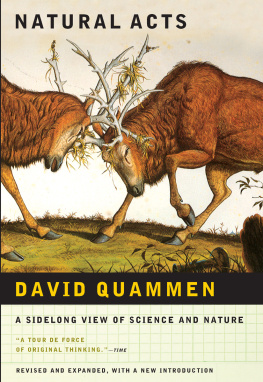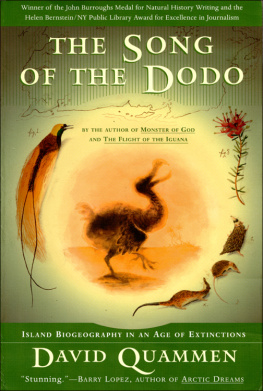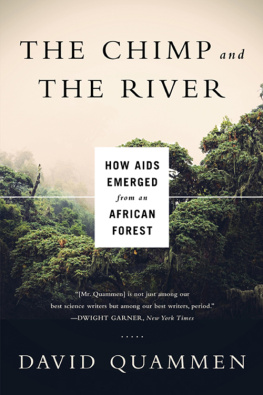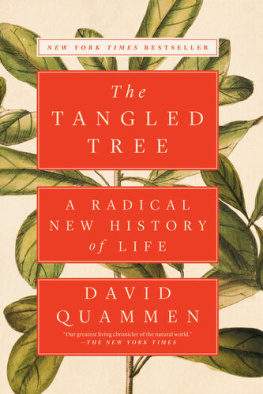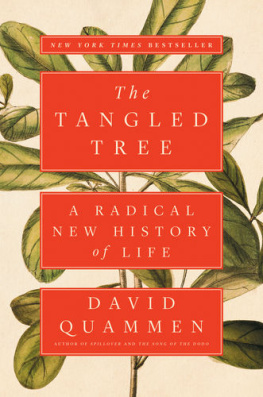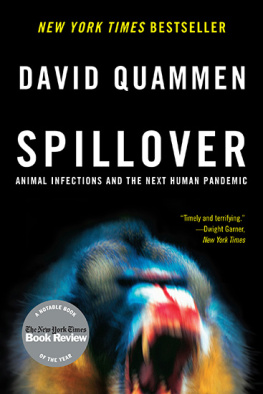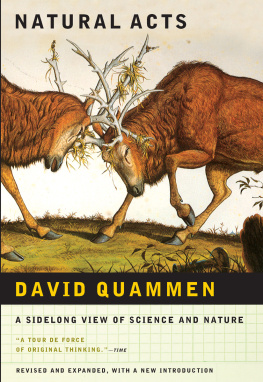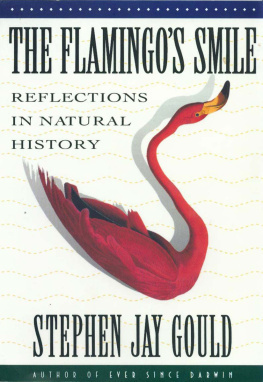Revised and expanded edition, with a new introduction Including Planet of Weeds and the Megatransect series
W. W. NORTON & COMPANY
New York London
To M.E.Q. and W.A.Q.
for everything
Copyright 2008, 1985 by David Quammen
All rights reserved
For information about permission to reproduce selections from this book, write to Permissions, W. W. Norton & Company, Inc. 500 Fifth Avenue, New York, NY 10110
September 1, 1939, copyright 1940 & renewed 1968 by W.H. Auden, As I Walked Out One Evening, copyright 1940 & renewed 1968 by W.H. Auden, from Collected Poems by W.H. Auden. Used by permission of Random House, Inc.
Production manager: Andrew Marasia
Library of Congress Cataloging-in-Publication Data
Quammen, David, 1948
Natural acts: a sidelong view of science & nature / David Quammen.
Rev. and expanded ed., with a new introduction including Planet of weeds and the Megatransect series.
p. cm.
Includes bibliographical references.
ISBN: 978-0-393-07632-5
1. Natural historyMiscellanea. I. Title.
QH45.5.Q36 2008
508dc22
2007027545
W. W. Norton & Company, Inc., 500 Fifth Avenue, New York, N.Y. 10110
www.wwnorton.com
W. W. Norton & Company Ltd.Castle House, 75/76 Wells Street, London W1T 3QT
Song lyrics in this ebook are not displayed owing to permissions issues.
2 3 4 5 6 7 8 9 0
CONTENTS
NEW, RETROSPECTIVE INTRODUCTION
Learning Curve
THIS BOOK AS YOU HOLD IT is a chimerical creature, like a griffin, bird-shaped in front with a mammalian caboose. It consists of two asymmetrical but, I hope, complementary halves: a selection of what I take to be the most durable of my recent shorter nonfiction (in the fourth section, titled After Thoughts) and a selection of my earliest work in roughly the same vein (sections one through three), most of which appeared in the first edition of Natural Acts , published in 1985. Combining them now in one volume is probably risky, and perhaps presumptuous, but Id like to think it serves three modest purposes: 1) reviving the best parts of a book that is otherwise out of print, 2) putting back into circulation some recent essays on subjects about which I have strong convictions (such as Planet of Weeds), and 3) offering readers evidence by juxtaposition of how one writer might have changed and developed over a period of twenty-six years.
Once I was a young man so blithe and unfettered that I could write the sentence Biology has great potential as vulgar entertainment. (See the following Old, Ingenuous Introduction.) It was like being a sleek juvenile shark before the remoras of sophistication and judiciousness attached themselves. I had, in those years, only recently blundered into the craft of science journalism. I was unencumbered by experience, professional qualifications, broad knowledge, or a sense of decorum. I had no training in science, but then again I had no training in journalism either.
It all began in the winter of 198081, when I wrote a short essay for Outside magazine on the redeeming merits, insofar as there are any, of mosquitoes. I had pitched the idea to the magazines editor, John Rasmus, after a long day of fly-fishing in the small Montana town where I then lived. Mr. Rasmus, an august figure (it seemed to me) but even younger than I, was visiting Montana to find and cultivate new voices. Along with Rasmus and a close friend (Stephen Byers, nowadays a New York editor himself), I took off in a johnboat to torment trout on our local stretch of river. After the big rainbows had been subdued and released and the sun had set behind the Gravelly Mountains, Steve and his wife of the time (E. Jean Carroll, now a columnist for Elle ) and I softened John up with a ranch-kitchen dinner of whiskey and steak and whiskey. Then I made my pitch: What about a piece on mosquitoes? The upside! The counterintuitive, good things to be said for those noxious insects! Um, okay, said poor Rasmus. Although the whiskey wore off within a day or two, the deal stuck.
My mosquito paean was intended to be a one-off piece. But sometime that winter, after receiving a draft, John called me with an unexpected proposition: Would I be interested in becoming a columnist for Outside , writing regularly on nature and science under the column title (already deployed in the magazine by a previous writer) Natural Acts? The mosquito piece, he suggested, could run as the first of my columns and I could follow in the same vein, with whatever nature-related expository and opinionated jive I cared to offer. At that moment, just beginning my efforts at free-lancing, I could scarcely go to the grocery store and buy hamburger without first balancing my checkbook to see exactly where I stood. Yes, I said. Yes, absolutely, Ill be glad to do itfor a year or two.
Fifteen years passed and, son of a gun, I found I had written about 160 columns. During that time I had been given extraordinary freedom and trust by John Rasmus and his successors, indulged to follow my curiosity virtually wherever it led (so long as each monthly essay had some connection to nature or science) and to educate myself somewhat in the fields of ecology, field biology, and evolutionary theory. I was still an outsider to the biological sciences, a nonexpert with a noneducation, but those areas had become familiar to me as a journalistic beat. You dont have to be a cop or a burglar to cover the crime stories down at the courthouse, and you dont have to be a biologist to write about biology. My lack of formal scientific training may even have been an advantage in some ways, leaving me with a fresh eye and an ingenuous ignorance similar to those of the general readers as whose proxy I tried to serve.

